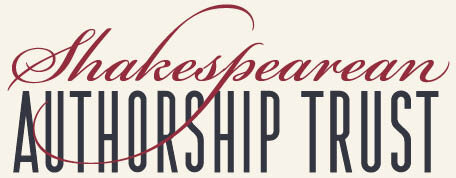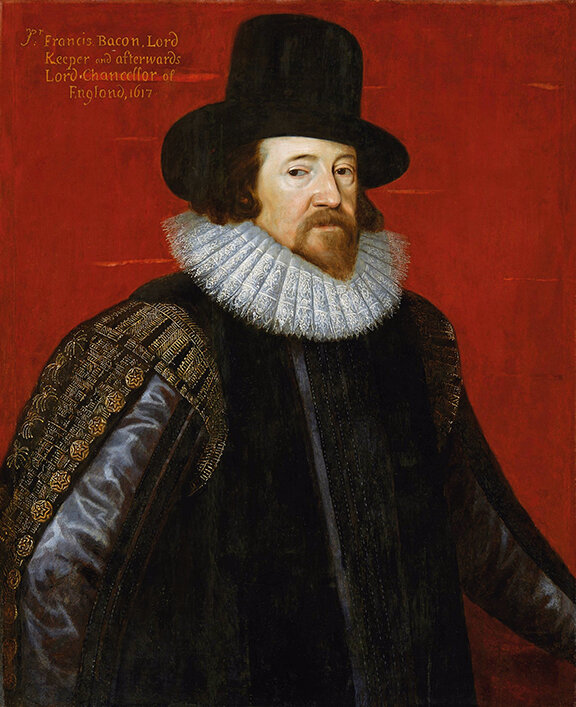Sir Francis Bacon,
Baron Verulam, Viscount St. Alban
Dates:
1561 – 1626
Background:
Educated privately and then at Cambridge University.
Entered Gray's Inn in 1579 as a student-lawyer, becoming a barrister, Bencher, and Treasurer of Gray's Inn.
Spent three years with the French Court (1576-79), and made at least one visit to Scotland (1584).
Leader of a literary society and scrivenery that included poets such as Ben Jonson, John Lyly, John Florio, John Davies of Hereford, Sir John Davies, and George Herbert.
Member of the Essex-Southampton-Sidney-Pembroke circle.
Member of the Elizabethan intelligence network.
Involved with writing and producing masques for the Inns of Court.
Wrote plays for the stage and speeches for court pageants.
Wrote in numerous different styles and successfully imitated other people's styles.
Famous for:
Extraordinary public service as an MP and a legal adviser to the Crown, and later in life as a privy counsellor, Solicitor General, Attorney General, and ultimately Lord Keeper of the Great Seal and Lord Chancellor.
A renowned philosopher, prolific writer, dedicated to developing the arts and sciences, and whose passion was for the poetic “waters of Parnassus.”
Celebrated by Ben Jonson as the “mark and acme” of the English language, who had “filled up all numbers” and was “one of the greatest men, and most worthy of admiration, that had been in many ages.”
The Case:
Bacon‘s life experience, attitudes, interests, philosophy, wit, vocabulary, and learning matches that to be found in the Shakespeare works.
Bacon relished poetry and the theatre as a branch of learning, a source of delight, and a means of educating people to virtue.
Bacon was described by friends as a “concealed poet” and ”the precious gem of concealed literature.”
Joseph Hall and John Marston, in an exchange of Satires published between 1597–1598, identify Francis Bacon as the author of the Shakespeare poems, Venus and Adonis and The Rape of Lucrece.
The contents page of The Northumberland Manuscript, from Bacon’s scrivenery, lists works by Francis Bacon that include two Shakespeare plays, Richard II and Richard III, with the direct inference that Bacon was their author.
Bacon admitted that he was the source of John Hayward’s book, The First Part of the Life and Raigne of King Henrie IIII, which source was the Shakespeare play, Richard 2, “which though it grew from me,” said Bacon, “went after about in other’s names.”
Bacon referred to by his contemporaries as ‘Apollo’ and 'Leader of the Muses', 'the golden stream of eloquence' who renovated Philosophy “in the socks of Comedy” and “the buskin of Tragedy.”
Bacon likened to Pallas Athena, the “Spear-shaker.”
There are Bacon signatures hidden in the printed Shakespeare works.
Bacon’s friend, Tobie Matthew, wrote that Bacon was known to the world under another name.
Bacon even considered publishing his philosophical works under a pseudonym.
Bacon was a Christian kabbalist who believed in the kabbalistic maxim that some things are to be revealed whilst others are to be concealed. The underlying structure of most of the Shakespeare plays is kabbalistic.
Bacon’s life not only spans the whole Shakespeare period, but fits with the choice and production of the Shakespeare plays.
A major source for the Shakespeare play, The Tempest, was the confidential letter, True Reportory, sent back from the Virginia colony in 1610 for the Council of the Virginia Company, of which Bacon was a prominent member.
In the Shakespeare play Henry 8, the four lords who relieve Wolsey of the Great Seal are the same four in title who relieved Bacon of the Great Seal. Historically, Wolsey was relieved of the Great Seal by only two lords.
The Shakespeare Memorial at Stratford-upon-Avon describes two Shakespeares, like the Gemini: the Latin lines at the top of the inscription describe Shakespeare in words that uniquely fit Francis Bacon—as a famous statesman, philosopher, and scholar-poet, who lives “immortal” in Olympus; whilst the last two lines in abbreviated Latin note the age and date of death of the “mortal” actor Shakspere.
Links for further information
Sir Francis Bacon's New Advancement of Learning
An Authorship Analysis: Francis Bacon as Shake-speare
Books for further information
The Bacon Shakespeare Question: The Baconian Theory Made Sane, by N. B. Cockburn, 1998
Bacon is Shake-speare, together with a Reprint of Bacon’s Promus of Formularies and Elegancies, by Edwin Durning-Lawrence, 1910
The Shakespeare Enigma: Unravelling the Story of the Two Poets, by Peter Dawkins, 2004
Sir Francis Bacon Cipher Story (five volumes), by Orville W. Owen, 1893-95
Is Shakespeare Dead?, by Mark Twain, 1909
Bacon’s Shakespeare: Facts Pointing to Francis Bacon as Author of the Shakespeare Poems and Plays, by Peter Dawkins, 2007
The Shakespeare Puzzle: A Non-esoteric Baconian Theory, by Barry R. Clarke, 2007
Francis Bacon’s Contribution to Shakespeare: A New Attribution Method (Routledge Studies in Shakespeare, by Barry R. Clarke, 2019
The Bacon-Shakespeare Anatomy, by W. S. Melsome, 1945

